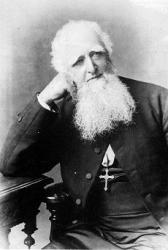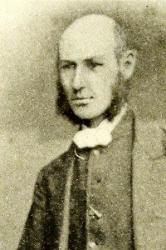Planning worship?
Check out our sister site, ZeteoSearch.org,
for 20+ additional resources related to your search.
- |
User Links
Person Results
H. W. Baker

1821 - 1877 Person Name: Henry Williams Baker Alterer of "We love the place, O God" in The Evangelical Hymnal with Tunes Baker, Sir Henry Williams, Bart., eldest son of Admiral Sir Henry Loraine Baker, born in London, May 27, 1821, and educated at Trinity College, Cambridge, where he graduated, B.A. 1844, M.A. 1847. Taking Holy Orders in 1844, he became, in 1851, Vicar of Monkland, Herefordshire. This benefice he held to his death, on Monday, Feb. 12, 1877. He succeeded to the Baronetcy in 1851. Sir Henry's name is intimately associated with hymnody. One of his earliest compositions was the very beautiful hymn, "Oh! what if we are Christ's," which he contributed to Murray's Hymnal for the Use of the English Church, 1852. His hymns, including metrical litanies and translations, number in the revised edition of Hymns Ancient & Modern, 33 in all. These were contributed at various times to Murray's Hymnal, Hymns Ancient & Modern and the London Mission Hymn Book, 1876-7. The last contains his three latest hymns. These are not included in Hymns Ancient & Modern. Of his hymns four only are in the highest strains of jubilation, another four are bright and cheerful, and the remainder are very tender, but exceedingly plaintive, sometimes even to sadness. Even those which at first seem bright and cheerful have an undertone of plaintiveness, and leave a dreamy sadness upon the spirit of the singer. Poetical figures, far-fetched illustrations, and difficult compound words, he entirely eschewed. In his simplicity of language, smoothness of rhythm, and earnestness of utterance, he reminds one forcibly of the saintly Lyte. In common with Lyte also, if a subject presented itself to his mind with striking contrasts of lights and shadows, he almost invariably sought shelter in the shadows. The last audible words which lingered on his dying lips were the third stanza of his exquisite rendering of the 23rd Psalm, "The King of Love, my Shepherd is:"—
Perverse and foolish, oft I strayed,
But yet in love He sought me,
And on His Shoulder gently laid,
And home, rejoicing, brought me."
This tender sadness, brightened by a soft calm peace, was an epitome of his poetical life.
Sir Henry's labours as the Editor of Hymns Ancient & Modern were very arduous. The trial copy was distributed amongst a few friends in 1859; first ed. published 1861, and the Appendix, in 1868; the trial copy of the revised ed. was issued in 1874, and the publication followed in 1875. In addition he edited Hymns for the London Mission, 1874, and Hymns for Mission Services, n.d., c. 1876-7. He also published Daily Prayers for those who work hard; a Daily Text Book, &c. In Hymns Ancient & Modern there are also four tunes (33, 211, 254, 472) the melodies of which are by Sir Henry, and the harmonies by Dr. Monk. He died Feb. 12, 1877.
--John Julian, Dictionary of Hymnology (1907)
H. W. Baker
Anonymous
Person Name: Unknown Composer of "QUAM DILECTA" in The Church Hymnal In some hymnals, the editors noted that a hymn's author is unknown to them, and so this artificial "person" entry is used to reflect that fact. Obviously, the hymns attributed to "Author Unknown" "Unknown" or "Anonymous" could have been written by many people over a span of many centuries.
Anonymous
Samuel Sebastian Wesley

1810 - 1876 Person Name: Samuel Sebastian Wesley (1810-1876) Composer of "BEDMINSTER" in The Oxford Hymn Book Samuel Sebastian Wesley (b. London, England, 1810; d. Gloucester, England, 1876) was an English organist and composer. The grandson of Charles Wesley, he was born in London, and sang in the choir of the Chapel Royal as a boy. He learned composition and organ from his father, Samuel, completed a doctorate in music at Oxford, and composed for piano, organ, and choir. He was organist at Hereford Cathedral (1832-1835), Exeter Cathedral (1835-1842), Leeds Parish Church (1842-1849), Winchester Cathedral (1849-1865), and Gloucester Cathedral (1865-1876). Wesley strove to improve the standards of church music and the status of church musicians; his observations and plans for reform were published as A Few Words on Cathedral Music and the Music System of the Church (1849). He was the musical editor of Charles Kemble's A Selection of Psalms and Hymns (1864) and of the Wellburn Appendix of Original Hymns and Tunes (1875) but is best known as the compiler of The European Psalmist (1872), in which some 130 of the 733 hymn tunes were written by him.
Bert Polman
Samuel Sebastian Wesley
L. G. Hayne
1836 - 1883 Person Name: Rev. L. G. Hayne Composer of "ST. CECILIA" in Church Hymns and Tunes Born: February 28, 1836, St. David’s Hall, Exeter, England.
Died: March 3, 1883, Bradfield, Essex, England.
Son of Richard Hayne, Rector of Mistley, Leighton graduated from Eton and Queen’s College, Oxford (BMus 1856, DMus 1860); at school, he was Eton College’s organist and conducted the Oxford University chorus. He also served as chaplain of Queen’s College; Vicar of Helston, Cornwall (1866-67); Succentor of Eton (1867-71); and Rector of Mistley, Essex (1871-83), and was well known as an organ builder.
Music:
BUCKLAND
CHALVEY
ST. CECILIA
ST. LAWRENCE
--www.hymntime.com/tch/
L. G. Hayne
William Bullock
1797 - 1874 Person Name: Rev. William Bullock Author of "We love the place, O God" in Church Hymns and Tunes Bullock, William, D.D., a Missionary of the S. P. G. for 32 years, and sometime Dean of Halifax, Nova Scotia, and died. March 16, 1874. He is known to hymnody principally through his popular hymn (in its revised form by Sir H. W. Baker), "We love the place, O God" (q. v.). This appeared with other hymns of merit in his:—
Songs of the Church, Halifax, printed for the Author, 1854, Other hymns from the same work are in common use. All his hymns were “written amidst the various scenes of missionary life, and are intended for the private and domestic use of Christians in new countries deprived of all public worship," and are worthy of renewed attention. Dean Bullock also published Practical Lectures upon the History of Joseph and his Brethren, 1826.
-- John Julian, Dictionary of Hymnology (1907)
William Bullock
Henry Lascelles Jenner

1820 - 1898 Person Name: Henry L. Jenner Composer of "QUAM DILECTA" in The Hymnal Jenner, Henry Lascelles, D.D., was educated at Trinity Hall, Cambridge (LL.B. 1841, in honours; D.D. 1867). Taking Holy Orders in 1843, he held several appointments until 1866, when he was consecrated Bishop of Dunedin. He retired in 1871. He is at present [1891] vicar of Preston-next-Wingham, Diocese of Canterbury, to which he was presented in 1854. His hymn in the 1889 Supplemental Hymns to Hymns Ancient & Modern, "Christians, sing out with exultation" (Christmas), is a translation of "Faisons éclater notre joie." See p. 391, ii.
--John Julian, Dictionary of Hymnology, Appendix, Part II (1907)
=============
Jenner, H. L., p. 1574, i. Bp. Jenner was born in 1820, and died in 1898. In C. W. A. Brooke's Additional Hymns, 1903, Nos. 962-966 are by Bp. Jenner and "A. Jenner." They are the "Catechism in Verse," and consist of 50 stanzas and a "Kyrie." They are well adapted for singing in connection with catechising in Church and School.
--John Julian, Dictionary of Hymnology, New Supplement (1907)
Henry Lascelles Jenner
U. C. Burnap

1834 - 1900 Person Name: Uzziah C. Burnap Composer of "BAXTER" in Mawl a chân = praise and song Burnap ran a dry goods business in Brooklyn, though he graduated from the University of Paris with a music degree, and for 37 years played the organ at the Reformed Church in Brooklyn Heights. He was a prolific composer, and helped edit the following:
Hymns of the Church, 1869
Hymns of Prayer and Praise, 1871
Hymns and Songs of Praise, 1874
--The Cyber Hymnal™
There is uncertainty about his middle name. Reynolds and the Library of Congress say it was Christopher. A contemporary obituary relied on by "The Cyber Hymnal™" says it was Cicero. It appears that there was another Uzziah C[icero] Burnap who lived (per LOC) 1794-1854.
U. C. Burnap
Daniel Hughes
Person Name: D. H. Translator of "Ni garwn, Dduw, y lle (We love the place, O God)" in Mawl a chân = praise and song
Daniel Hughes
Oswald Mosley Feilden

1837 - 1924 Person Name: O. M. Feilden Composer of "EDEN" in The Presbyterian Book of Praise Born: September 16, 1837, Canterbury, England.
Died: June 19, 1924, Oswestry, England.
Buried: St. Andrew’s Church, Welsh Frankton, Ellesmere, Shropshire, England.
Feilden graduated from Christ Church College, Oxford, in 1859, and in 1861 became assistant Curate at Whittington, Shropshire, under William How. In addition to his pastoral duties, Feilden was a keen botanist, and was president of the Offa Field Club (a local botanical group formed in 1888), and was responsible for much of the data and population work on wild flowers in the locality. His colleague Thomas Diamond published Flora of Oswestry, their account of the botany of the area, in 1891, though it seems Feilden was the botanist while Diamond was the collator. The book included the first recording of Mountain Everlasting (Antennaria dioica) on Llanymynech Hill, Juniper (Juniperus communis) at Carregybig and Creeping Willow (Salix repens) at Glopa.
--www.hymntime.com/tch
Oswald Mosley Feilden
C. Warwick Jordan
1840 - 1909 Person Name: C. W. Jordan Composer of "DOMUS DOMINI" in The Church Hymnal Born: January 27, 1841, Bristol, Gloucester, England.
Died: August 30, 1909, Hayward’s Heath, Sussex, England.
Cremated: Golders Green, London, England.
Jordan began his musical career as a chorister, first at Bristol Cathedral and later at St. Paul’s Cathedral. He was educated at Oxford (BMus 1869), and received the Lambeth degree of Doctor of Music in 1886.
A champion of plainsong, he was an honorary organist of the London Gregorian Association, where he took a prominent part in the annual festivals at St. Paul’s Cathedral. He was a professor of organ and harmony at the Guildhall School of Music, and an honorary fellow, examiner and treasurer of the Royal College of Organists.
Jordan held organist positions at St. Paul’s, Bunhill Row (1857); St. Luke’s Holloway (1860); and from 1866 until his death at St. Stephen’s Church, Lewisham (where he was also choir master). His works include:
One Hundred and Fifty Harmonies (London: Novello, Ewer & Company, 1880)
--www.hymntime.com/tch
C. Warwick Jordan


 My Starred Hymns
My Starred Hymns


